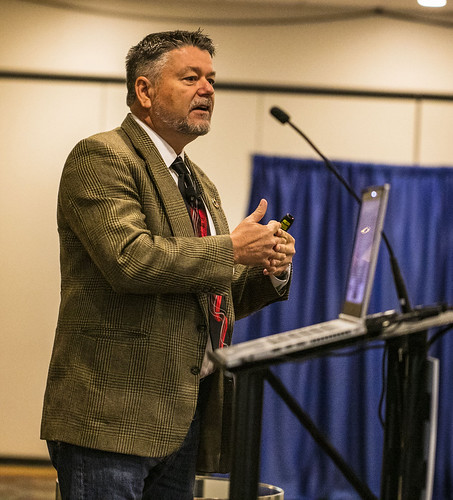Matlock, champion of science in sustainability, honored with Borlaug CAST Communication Award
By Mary Hightower
U of A System Division of Agriculture
Oct. 18, 2018
Fast facts
- Marty Matlock is director of Resiliency Center at UA Fayetteville.
- Matlock: ‘Prosperity is well-being’ not wealth.
- Cochran: Matlock is a ‘champion for the role science in food and agriculture systems.’
(534 words)
(Newsrooms: with art at https://flic.kr/s/aHsmrYdnFg )
(Download this story in MS Word format here.)
DES MOINES, Iowa – Social connections and urban agriculture are waypoints to human prosperity, said Marty Matlock, winner of the Borlaug Communication Award from CAST, the Council for Agricultural Science and Technology.
Matlock, an advocate for the role of science in defining and measuring success in agricultural and food system sustainability, was honored by CAST on Wednesday. The award is named for Norman Borlaug, an agronomist who earned a Nobel Peace Prize, World Food Prize and the Presidential Medal of Freedom for his work.
Matlock is director of the Resiliency Center at the University of Arkansas, and a professor of ecological engineering in the department of biological and agricultural engineering. While at Texas A&M, Borlaug advised Matlock through the first four years of his academic career, encouraging him to explore the complex intersection of community poverty, food, and water—these are now focal issues for the University of Arkansas Resiliency Center.
Defining prosperity
Following acceptance of the award, Matlock presented “The Promise of Prosperity from the Land in the 21st Century.” His wide-ranging talk included the changing role of women in agriculture, the need to redesign what he said was an agricultural system that dated back to the 1940s and even the definition of “prosperity.”
“The promise of prosperity from the land is really in the promise of human well-being. … Prosperity is not wealth. Prosperity is well-being,” Matlock said, noting that some of the happiest people are in places that aren’t necessarily the wealthiest. ”Social connections are the keys to that happiness.”
“You cannot have a functioning economic system without a functioning social system. You cannot have a functioning social system without a functioning ecosystem,” he said. “We’re all in this together.”
Matlock noted that we are “54 percent urban as a species now. This very urban agriculture is the key to our future prosperity.”
“I’m pleased to see Dr. Matlock receive this award,” said Mark Cochran, a member of the CAST board of directors and vice president-agriculture for the University of Arkansas System. “He’s a scientist of international renown, an effective communicator and a champion for the role of science in food and agriculture systems.”
In introducing Matlock, Cochran said “he has been tireless, innovative and persuasive in his efforts to bring a science foundation to the definition of agricultural sustainability, and empirical measures of continual improvement.”
CAST announced Matlock’s honor in April, the result of a nomination by Lalit Verma, head of the department of biological and agricultural engineering, at the University of Arkansas.
“Dr. Matlock has become the world’s leader in the science of agricultural sustainability. He has been engaged in tireless promotion of the science of sustainability in agriculture and is passionate about communicating the advances made in U.S. agriculture in the context of global challenges and demands,” Verma said. “He has provided leadership in advancing agricultural sustainability in policy and practice across the food industry, the agricultural community, academic programs, and government policy.”
Matlock received his Ph.D. in biosystems engineering from Oklahoma State University.
Over the past six years, he has participated in more than 116 keynote presentations, discussion sessions, and video interviews. Since 2011, he has published 19 peer-reviewed manuscripts, co-authored two books and six international policy reports, been awarded three U.S. patents, and received more than 15 professional leadership awards.
About the Division of Agriculture
The University of Arkansas System Division of Agriculture’s mission is to strengthen agriculture, communities, and families by connecting trusted research to the adoption of best practices. Through the Agricultural Experiment Station and the Cooperative Extension Service, the Division of Agriculture conducts research and extension work within the nation’s historic land grant education system.
The Division of Agriculture is one of 20 entities within the University of Arkansas System. It has offices in all 75 counties in Arkansas and faculty on five system campuses.
Pursuant to 7 CFR § 15.3, the University of Arkansas System Division of Agriculture offers all its Extension and Research programs and services (including employment) without regard to race, color, sex, national origin, religion, age, disability, marital or veteran status, genetic information, sexual preference, pregnancy or any other legally protected status, and is an equal opportunity institution.
# # #
Media Contact: Mary Hightower
Dir. of Communication Services
U of A System Division of Agriculture
Cooperative Extension Service
(501) 671-2126
mhightower@uada.edu
